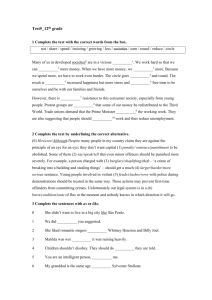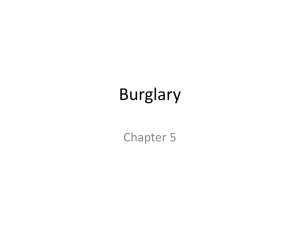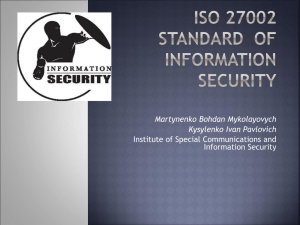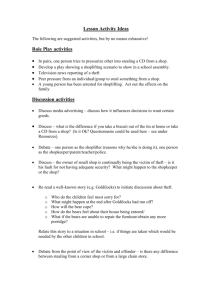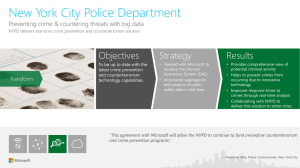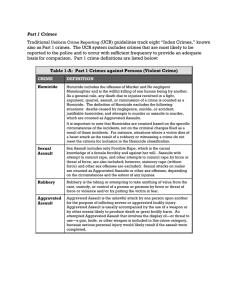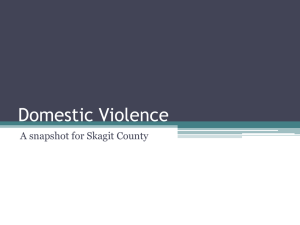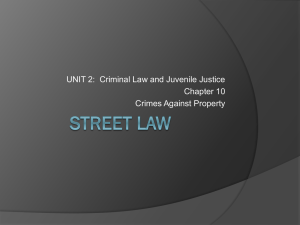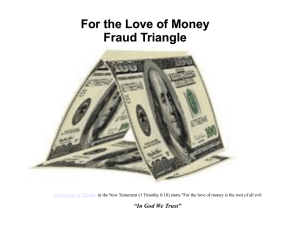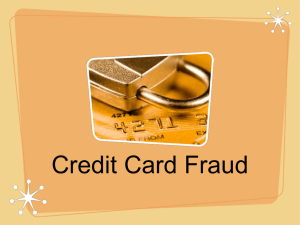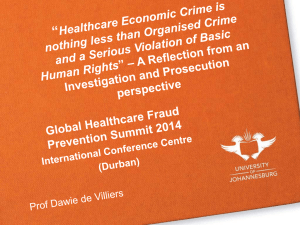10. Crimes Against Property
advertisement
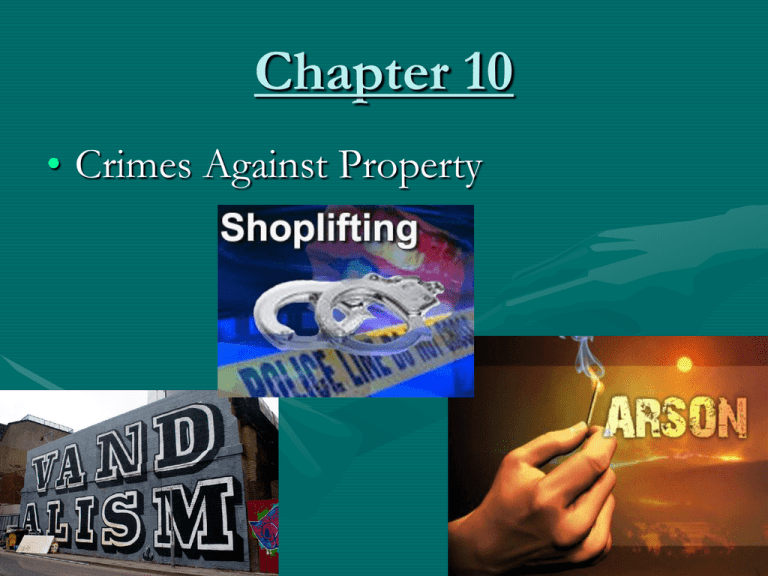
Chapter 10 • Crimes Against Property Crimes Against Property ARSON: the willful and malicious burning of a person’s property, often with the intent to defraud insurance companies VALDALISM: “malicious mischief” –willful destruction of, or damage to, the property of another Quick Review 1) Why do young people sometimes commit acts of vandalism? 2) What, if anything, can be done to reduce vandalism? 3) Should parents be held criminally responsible for willful damage caused by their children? WHY or WHY NOT? 4) If you saw two students throwing rocks through the windows of a school at night, would you report the students to the police? WHY or WHY NOT? 5) Suppose you saw two friends throwing rocks through the window of a neighbor’s home. Would you report your friends to the police? WHY or WHY NOT? *** Did you answer the two questions the same way? If not, explain why. Crimes Against Property • LARCENY: the unlawful taking and carrying away of the property of another person against his/her will with intent to permanently deprive the owner of it. • SHOPLIFTING: taking items from stores without paying for them Quick Review 1) Why do you think people shoplift? Why do so many teens shoplift? List the reasons 2) What could be done to address each of the reasons for shoplifting you listed? Which would be most effective? WHY 3) IF you saw a stranger shoplifting in a store, what would you do? Would your answer be different if you knew the person? 4) A movie star is caught shoplifting thousands of dollars worth of merchandise. It is her first offense. What penalty should she receive? Would the penalty you recommend be different if she were not famous? Book Assignment • Read page 118 in your “Street Law” book • Answer the questions below 1) What human rights might the teenagers claim are being violated by the searches? 2) What human rights might Mr. Zimmerman claim are being violated by the shoplifting? 3) Whose human rights are more important in this situation? EXPLAIN 4) Write a 1 to 2 page script between Mr. Zimmerman, his security guards, and the teens. What options might Mr. Zimmerman have for addressing the problem of shoplifting in his store? Were these or any options used in your script? Crimes Against Property • EMBEZZLEMENT: the unlawful taking of property by someone to whom it was entrusted • ROBBERY: the unlawful taking of property from a person’s immediate possession by force or intimidation (involves both theft and force) • EXTORTION: “BLACKMAIL” the use of threats to obtain the property of another (physical harm, destroy property, injure someone’s character/reputation) Crimes Against Property (continued) • BURGLARY: the unauthorized entry into any structure with the intent to commit a crime. Penalties are stiffer is a weapon was used, a person was present) • FORGERY: when a person falsely makes or alters a writing or document with intent to defraud • RECEIVING STOLEN PROPERTY: if you receive or buy property that you know or have reason to believe is stolen Ivan met up with his friend Anthony, who was driving a flashy new red convertible. Ivan knew that neither Anthony nor his family owned this car, but it looked good so he got in and let Anthony take him for a ride. Ivan also knew that Anthony used drugs and sometimes took other people’s things and sold them to get money to buy cocaine. Anthony offered to sell Ivan an MP3 player he had in the back seat of the car for $40. Ivan agreed to pay him the money. 1) Have any crime been committed? If so, which crimes and by whom? 2) Why does society make receiving stolen property a crime? Should it be? 3) Would you ever buy something for an extremely low price from a friend? How would you know for sure it was not stolen? Crimes Against Property (continued) • UNAUTHORIZED USE OF A VEHICLE: “JOYRIDING” the unauthorized temporary taking of a vehicle “CARJACKING” use of force or intimidation to steal a car from a driver • CYBERCRIME: “COMPUTER CRIME” covers a wide range of crimes in which a computer is used (theft, stalking, spamming, denial-of-service, hacking, illegal downloads, possession of types of pornography, phishing, viruses) • Open your book to p.125. Answer A-H Cybercrime • Cybercrimes often don’t fit into traditional crime laws HACKERS – ?? Are hackers criminals or creative crusaders who point out flaws in they systems?? • What motivates hackers COMPUTER SEARCHES - Federal officials and law enforcement must get a search warrant before seizing or reading any electronic mail - Private employers Identity Theft Despite the great benefits our society has gained from technological developments, technology has also spawned the development of a new type of crime – “IDENTITY THEFT” They steal a piece of personal information such as your SS#, your bank account number, or a credit card number and use it to commit fraud or further theft. Everyday actions like throwing out your garbage, sending a rent check to your landlord, or ordering a book online can put you at risk If someone steals and uses your personal information, it can cost you hundreds or thousands of dollars. It can also cost you your credit rating and good name, not to mention hours of time and stress to clear up the problem While we cannot completely stop identity theft, there are things you can do to protect yourself and minimize your exposure to this crime Methods of Identity Theft • Dumpster Diving – rummage through trash • Skimming – Steal credit/debit card numbers when your card is processed • Phishing – Pretend to be a financial institution to get you to reveal your personal information • Changing Your Address – Divert your mail to another address steal information • Old-Fashioned Stealing – Steal wallets/purses to gain access to information • Pretexting – Obtain your information from other sources, like businesses, phone companies, etc Identity Theft What can you do? Check your Credit Report Be wary of any unsolicited or unfamiliar emails Protect your personal information in your home Create passwords that are not easy to guess DO NOT give personal info out unless you are very sure of who you are dealing with Guard your mail and trash from theft DO NOT carry your SS card with you and avoid giving out your SS# Pay attention to your bank, credit card, charge card statements. Report any inconsistencies Ch 8-10 Essays 1) What does the “STATE” have to prove to convict a person of a crime? Give specific examples 2) Identify what a CRIME AGAINST A PERSON is and give 3 specific examples 3) Identify what a CRIME AGAINST PROPERTY is and give3 specific examples
